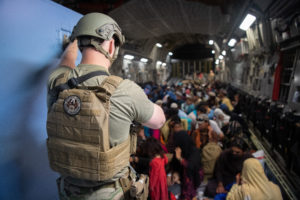
Baltimore Hebrew Congregation is gearing up to live out the principle of loving the stranger, as the synagogue prepares to demonstrate its capacity to support a family from Afghanistan and assist in their transition to life in the United States.
Currently, many refugee families from Afghanistan are living on U.S. military bases. The nonprofit HIAS, an official resettlement agency, is assisting the federal government in identifying local organizations, such as synagogues, who are willing and able to help these families establish their roots in American communities. BHC plans to demonstrate it is capable of this responsibility.
“There’s about 40,000 people, Afghan refugees, that are currently living on military bases,” said Julie Simon, co-chair of BHC’s immigration task force. “They were part of that airlift … when the U.S. withdrew. And the resettlement agencies are resettling them around the country.
“We are looking to welcome a family here in Baltimore,” continued Simon, a resident of Towson. “So we will be working with a family, if this all works out. … There’ll be a family coming to Baltimore that we will be responsible for assisting in the resettlement effort.”
Simon had the idea for BHC to participate in HIAS’ resettlement efforts, or “welcome circles,” after seeing some of the organization’s online resources on the subject, which HIAS had been broadly sharing with American congregations, she said. After exploring the idea with Rabbi Elissa Sachs-Kohen and receiving positive responses from the board, who were willing to help with the financial commitments, and from congregants who wanted to be involved, BHC began moving forward.
Simon stressed that the Afghan families in question are already physically in the United States, being housed in military bases around the country.
“We’re not bringing anyone over from Afghanistan,” Simon said.
Currently, BHC is researching how they can support an Afghan family if the synagogue is approved for the program, Simon explained. This includes creating a budget of how BHC would provide for the needs of an Afghan family for the first three to six months in the local area, as resettlement agencies need to make 90-day commitments, though HIAS is asking for 180 days. These needs include housing, language skills, access to services and getting any children the family had enrolled in school, among others.
The “back of the envelope” estimated cost of supporting an Afghan family for a period of 60-90 days is around $35,000, Simon said, with housing costs representing a sizable chunk of that. BHC is currently working on a fundraising campaign to gather that sum.
After developing a specific plan, BHC would then submit that to HIAS as part of a “welcome plan.” If satisfied, HIAS would then work through the national resettlement process to match BHC with a specific Afghan family. As of Dec. 17, Simon estimated that BHC was at least three to four weeks away from knowing the specific family the synagogue might be matched with.
“Overall, we’ll be doing the things that a resettlement agency would be doing,” Simon said. “So we will be responsible for, when they get here, having housing for them, making sure utilities are set up, that there’s furniture in the apartment, there’s food in the apartment.
“We’ll be sitting with them to make sure that they get access to whatever services, food stamps or Medicaid, whatever else they’re entitled to get under their refugee status,” Simon continued. “We will make sure that they’re matched with medical services, as well as with mental health services. We’ll be helping them to figure out the bus system. … We’ll be making sure that they have the whole array or resources and support that they need to successfully build a new life here in Baltimore.”
The goal is to make the family as self-sufficient as possible and to help them get integrated into the Baltimore community, Simon said.
“These people are coming to the United States under incredibly difficult circumstances,” Simon said. “Many of them on very short notice, able to bring very little from their prior lives with them. And that’s the story of many, many — not all— but many, many Jewish families in the United States, and so we have an obligation to welcome the stranger and share what we can share.”







